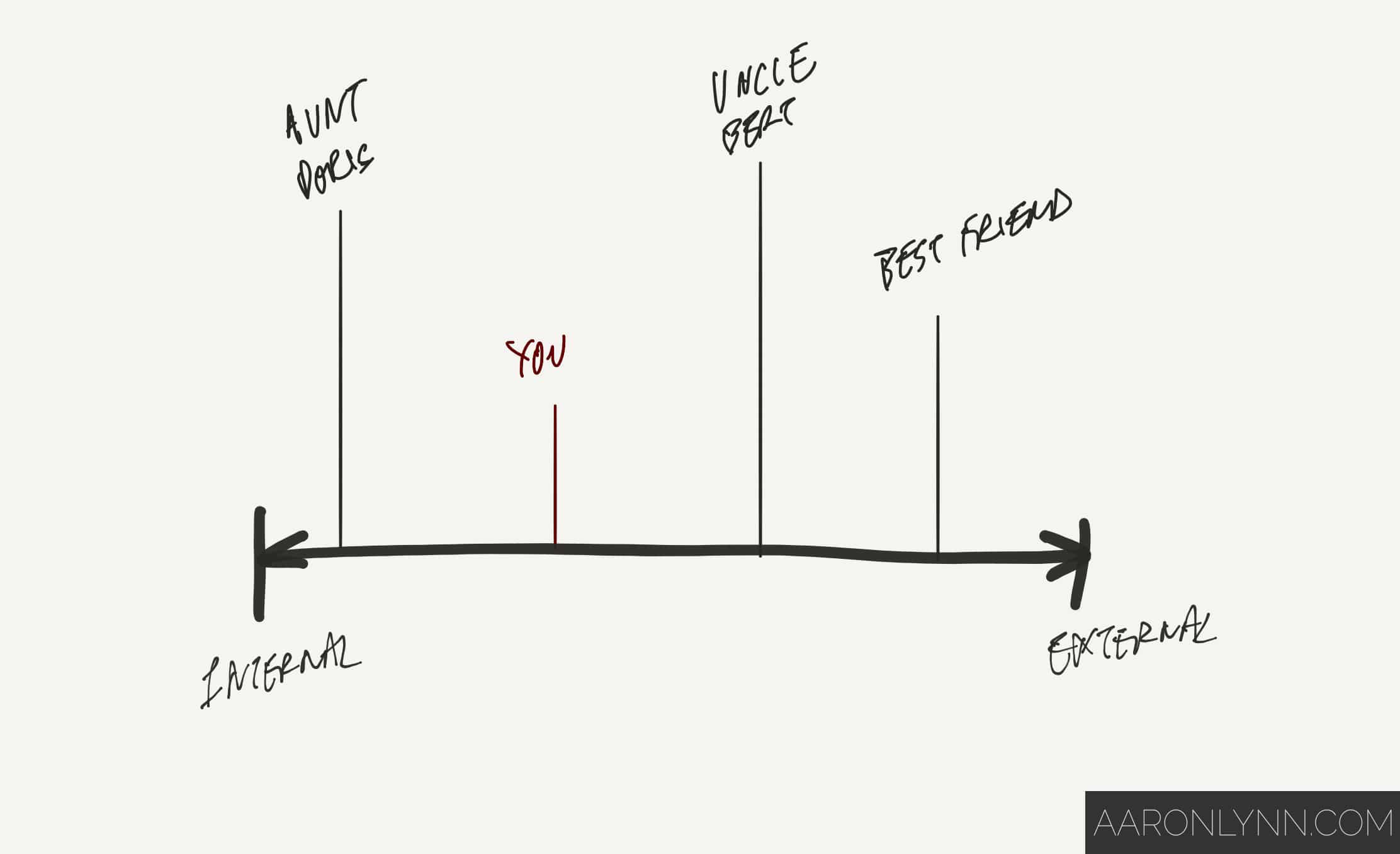
Let’s talk about the Instagram Effect.
Instagram as you know, is the most popular social network out there. As a friend of mine (who works for a large social network, not Instagram) puts it – “no other platform matters right now except Instagram”.1And Tik-Tok.
So what exactly is the Instagram Effect?
It’s the phenomenon where you think your life sucks because it doesn’t match up to the expectations in your mind.
For example, you go on holiday to the beach… but it’s not all picturesque sunsets and umbrella drinks in five-star luxury like that travel blogger you follow.
Or you post a gym selfie… but your abs and lines just don’t pop the same way that they do on your favourite Instagram fitness model.
And therein lies the problem with Instagram.
The Problem with Instagram
Now to be fair, it’s not just Instagram. Back in the early 2010s, those of us old enough to remember called this the “Facebook Effect”.2I’m picking on Instagram here but the same thing applies for every social network out there.
You see, the human brain is an amazing adaptation machine. Whatever you feed it, it will input, analyse, process and summarise very efficiently.
But what happens when you start feeding it things that are almost as good as real, but not actually “real”? As technology has progressed, our brains have had trouble distinguishing between what is “real” and what is not.
In the case of Instagram (and other social networks), what we see all day in our feeds are picture-perfect, curated scenes from other people’s lives.
We see friends (and complete strangers) with perfect meals, perfect selfies, perfect travel photos, perfect #relationshipgoals and perfect cats.
The problem with this is our brain becomes conditioned to seeing “perfect” and it starts to believe that “perfect” = reality.
But the truth is, it’s not real. What you are seeing is maybe 1% of what someone’s life is actually like – they are selecting from hundreds, if not thousands, of photos and videos to find the perfect one to show off online.
So from this, we can see that:
- What you see on Instagram is not real.
- It really should not affect you one way or the other.
But it does affect people, and the question is – why?
To answer this, we have to use a couple of mental models. The first, is the idea of first-hand versus second-hand experience. The second, is the idea of internal and external loci of control.3Yes, loci really is the plural of locus.
Model One: First-Hand Experience Versus Second-Hand Experience
First-hand experience is where we experience life through our own lying eyes and ears. I consider first-hand experience a virtue.
Second-hand experience is where we live vicariously through a recorded medium or the experience of another person, and where we tend to trust other people’s judgement more than our own.
For example, travelling to Paris is first-hand experience. Seeing photos and videos of Paris on Instagram is second-hand experience.4For people who read history: the idea of first-hand and second-hand experience lines up nicely with the idea of primary sources and secondary sources.
The idea of first-hand versus second-hand is at the core of the Instagram Effect.
When we live by first-hand experience, we make our own judgements about acceptable standards and are happier for it.
When we live by second-hand experience, we use the standards of others to judge our own lives, and we never seem to measure up.
And it’s not just Instagram – it’s every kind of second-hand source or media that we consume, from television, to movies, to our favourite bloggers and yes, even business and self-development books.
It’s worth noting that most people live their lives second-hand through social media and Google.
And if we just stop to think about it for a minute, what we are really doing, is this:
Watching other people live life and do interesting things on a screen, rather than going out and doing those interesting things ourselves.
Let the implications of that sink in for a moment.
I would argue that a life lived first-hand is better for you and leads to more happiness in the long-term, even if that life is not as “glamorous” as that vicariously consumed through second-hand sources.
The reason for this of course, is that you know what you are living is from your own actual experience, and that you are learning to trust in your own judgement (and know when others are bullshitting you).
It also helps you to set realistic expectations for what life should be like, and because of this, you are likely to be happier in the long-term.
And most importantly, I believe it to be the key to unlocking intrinsic motivation and an internal locus of control.
Model Two: Internal Versus External Loci of Control
An internal locus of control (also known as intrinsic motivation or an internal frame of reference) is where you do things because you genuinely, deep down, somewhere inside yourself, want to.
You take your cues to act (or not) from yourself, and from your own first-hand experience. You believe that you can control and change your circumstances, despite what is going on around you.
An external locus of control (also known as extrinsic motivation or an external frame of reference) is where you do things for a reward.
Where you take cues from the outside world for what you do, for what is good, for what is bad, and for how you should judge yourself.
Life “just happens” to you, without you having much say in the matter.
A simple example of this dichotomy would be going to the gym.
- Those who are externally driven, go because they want to show off, or because they want to become more attractive to members of their preferred sex, and are more likely to need to hire a trainer to “motivate”5i.e., force. them to show up.
- Those who are internally driven do it because it is just part of who they are. They have strong habits and they know what is good for them and they just do it, with no external motivators required.
This intrinsic drive is part of a deeply buried mindset that powers all their behaviours and actions.
People who are extrinsically motivated often look at those internally driven and ask “what drives you to do it, bro?”
What these people do not understand is that there is no simple answer, and that is because the answer lies completely outside the frame of reference of someone externally driven.
There is no singular thing that drives internally-referenced people – which is in essence saying there is really nothing. It is just part of who they are – part of their purpose, sense of identity, sense of being.
People are internal-external on a scale – it isn’t a binary choice. But people do lean one way or the other, and while there are no hard statistics on orientation, I would guess that 90% of the world is extrinsically motivated.
The obvious question that arises is why being intrinsically motivated or internally referenced is better.
I truly believe that being internally referenced is a good thing and an amazing advantage to have in life. There are studies showing that having external motivators actually harms progress and outcome achievement if you have some level of intrinsic motivation already.6Wrzesniewski, A., Schwartz, B., Cong, X., Kane, M., Omar, A. & Kolditz, T. Multiple motives don’t multiply motivation. Proceedings of the National Academy of Sciences Jul 2014, 111(30), 10990-10995. doi: 10.1073/pnas.1405298111
At a more everyday practical level, being intrinsically driven protects you from manipulation, as you judge yourself by your own standards.
You’ll find that you drive yourself harder over time because you don’t need external pressure to generate motivational “kicks”.
In fact, one of the most common traits amongst internally referenced people is that they sometimes drive themselves a little too hard, and need to learn to temper their internal drive with reasonableness.7Which is a virtue.
Being internally motivated also leads to autonomy and choice – the basic stuff of which happiness is made of.
So how does one tell if they are internally or externally motivated? Well…
- Do you follow trends/fads/celebrities? External.
- Do you need external pressures like deadlines, an overbearing supervisor or parent constantly telling you what to do? External.
- Do you start, do and complete projects on your own? Internal.
- Do you set your own deadlines and work hard to meet them? Internal.
- Do you beat yourself up for not being “good enough” according to your own standards? Internal.
- According to the standards of what you see on Instagram? External.
Well Darn-it, How Do I Become Internally Referenced?
You may be asking – well Aaron, all this is great but I’m not internally referenced. How do I make the switch?
Unfortunately there’s no magic bullet for this – there’s just lots of things you need to do over time. For example:
- Consume less media.
- Get off social media.8Yes, I realise the irony in that you likely arrived here from social media.
- Value experience over entertainment.
- Build self-reliance and resilience as virtues. You can do this by picking a project outside your current comfort zone and seeing it through, be it your body goals, wealth goals, or an arts/crafts/trades/work project.
- Grab my manifesto, Evolution, for free. And read it!
None of this is a once-off.
You don’t magically complete one thing and say “yay now I’m intrinsically motivated”.
Just as living externally focused is something you do every single day, living internally focused is exactly the same, and it is most definitely the path less travelled and the harder one to walk in life.
Here’s to living first-hand.
- And Tik-Tok.
- I’m picking on Instagram here but the same thing applies for every social network out there.
- Yes, loci really is the plural of locus.
- For people who read history: the idea of first-hand and second-hand experience lines up nicely with the idea of primary sources and secondary sources.
- i.e., force.
- Wrzesniewski, A., Schwartz, B., Cong, X., Kane, M., Omar, A. & Kolditz, T. Multiple motives don’t multiply motivation. Proceedings of the National Academy of Sciences Jul 2014, 111(30), 10990-10995. doi: 10.1073/pnas.1405298111
- Which is a virtue.
- Yes, I realise the irony in that you likely arrived here from a social network.
